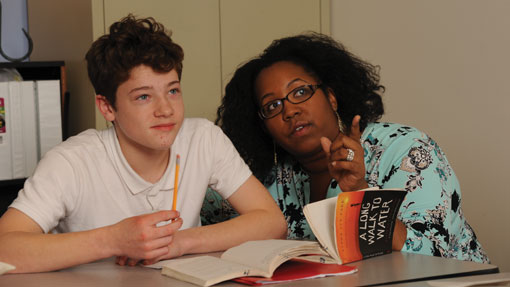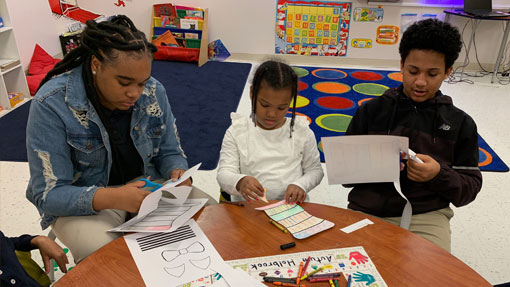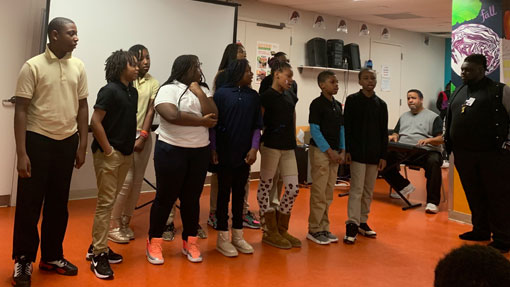Academics

Educational Focus
The Children’s Guild DC Public Charter School (TCGDC) is dedicated to ensuring that students in grades K-8 are on a path toward grade level achievement through targeted interventions and strategic instructional delivery. To accomplish this goal we draw from best practices from Transformation Education, TEACCH, on-line learning, Project Based Learning (PBL), child and adolescent development, Arts Integration, and information and communication technology. We leverage this collective understanding to provide least restrictive learning environment for all students.
TCGDC scholars will continue to develop their ability to think critically, solve problems creatively, be self-disciplined, and serve a cause larger than themselves with care and compassion.
Whole Brain Teaching
Whole Brain Teaching is an approach designed toward maximizing student engagement, and focusing on the way the brain is really designed to learn. TCGDC staff utilizes an integrated method combining effective classroom management and pedagogically sound approaches to student engagement to meet our student’s needs. Below are the five norms that will guide support our positive behavior program.
• Norm #1—Follow directions quickly
• Norm #2—Raise your hand for permission to speak
• Norm #3—Raise your hand to leave your seat
• Norm #4—Make smart choices
• Norm #5—Respect yourself, others, & the environment


Comprehensive Literacy
TCGDC embraces the breadth of literacy from phonics and phonemic awareness to the reading and analysis of both narrative and informational texts. In order to accomplish our ultimate goal – the ability to communicate understanding and context about literary works – TCGDC also integrates written expression throughout literacy block to ensure that students are able to demonstrate their learning to peers across the room, in the District, or around the world.
Mathematics
TCGDC understands the progression of learning required for students to be successful in the 21st century through the Common Core State Standards. In addition to learning across the domains – Counting and Cardinality, Operations and Algebraic Thinking, Number and Operations, the Number System, Ratios and Proportional Relationships, Expressions and Equations, Measurement and Data, Statistic and Probability, Functions, and Geometry – TCGDC prepares students to communicate their results and understanding of the frameworks for problem solving. We seek to ensure that students understand the process to solving a problem, as well as what their solution means in context. This approach allows students to solve similar problems in real life.


TEACCH (Training and Education of Autistic and Related Communication Handicapped Children)
TEACCH was developed at the University of North Carolina and provides the foundational structures that enable every student to succeed: environmental organization, schedules/routines, work systems and visual structures. Organizing the physical environment, developing schedules and work systems, making expectations clear and explicit, and using visual materials have been effective ways of developing skills and allowing students to work independently with success.
Project Based Learning (PBL)
PBL is the instructional delivery system that identifies teaching strategies that connects the “what” = Common Core State Standards to the “how” = Project Based Learning. PBL will enable teachers to differentiate learning to address the diverse learning needs of the students while providing real world connections and application of the curricular concepts. In addition, Project-based learning provides the connective tissue among discrete high school courses. PBL, through a thematic approach, provides an authentic application to subject content.


Child and Adolescent Development
Students and their development come first. We utilize the services of Student Support Centers (SSCs) which are staffed with behavior coaches to consult with students throughout the school day around a range of social and emotional considerations, which a child may encounter in their day. In the SSC, students collaborate with behavior coaches to develop an understanding of barriers to achieving school-wide expectations and practice strategies to employ in the future. Teachers receive feedback and support from behavior coaches to effectively accommodate the learning/behavioral needs of students. Behavior coaches also community with families to provide the continuity necessary to appropriately support students inside and outside of school.
Brain- Based Education
Brain-based education ensure that the whole brain is engaged during the instruction period. While processing familiar information; gathering new information; deciphering necessary information for problem solving; and then applying new knowledge to different situations and contexts, students are engaged in speaking, listening, and writing to internalize learning and communicate results during instruction.


Information and Communication Technology (ICT)
ICT are essential instruments for students in the learning environment, which is why TCGDC is a 1-to-1 learning environment for grades K-8. Students in Kindergarten through 4th grade will have their technology housed within the school building, while students in 5th through 8th grade will transport their technology between home and school to be able to complete projects and other work from home.
Students will also develop in their ability to communicate learning across platforms and across devices, in order to perform well in current learning experiences and to prepare for future learning experiences.

